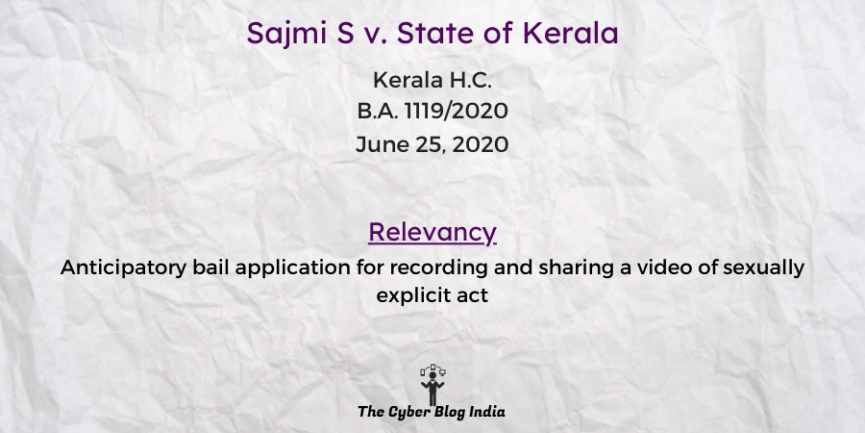Sajmi S. v. State of Kerala

Sajmi S v. State of Kerala
In the High Court of Kerala
B.A. 1119/2020
Before Justice Raja Vijayaraghavan V
Decided on June 25, 2020
Relevancy of the case: Anticipatory bail application for recording and sharing a video of sexually explicit act
Statutes and Provisions Involved
- The Information Technology Act, 2000 (Section 66A, 66E, 67A)
- The Indian Penal Code, 1860 (Section 34, 294(b), 447, 500, 506)
Relevant Facts of the Case
- The complainant was living with her family members comprising of her husband, two adult children, and grandchildren. Her relationship with her husband was strained for quite some time.
- She had a lover with whom she had a sexual relationship. Her family members did not know about this.
- When the husband was away, the complainant called her lover to her house and they had sexual intercourse.
- The petitioners, who were her neighbours, entered the courtyard of her house and started recording the intimate act between the complainant and her lover. After recording, the petitioners allegedly alerted the neighbour. Shocked by the acts of the complainant, her children and her husband left her.
- The next day, she received the video from her sister, who allegedly received it from the complainant’s daughter-in-law. The daughter-in-law received the video from one Beena, and the petitioner had allegedly forwarded the video to the aforementioned Beena.
- When the informant received information that the video is being circulated on social media, she approached the police and set the law in motion.
Prominent Arguments by the Advocates
- The petitioner’s counsel submitted that the petitioners are innocent and argued that the explicit video was in fact sent to the victim by her sister, who in turn had received the same from another woman. She further argued that if there was any genuineness in the allegation, there was no need for the de facto complainant to wait for a few months to set the law in motion.
- The respondent’s counsel argued that the petitioners had no necessity to trespass into the courtyard of the house and record the video of an explicit act. He further argued that the allegations are grave and if pre-arrest bail is granted, the investigating officer will have no opportunity to examine the mobile phones used for recording the explicit video.
Opinion of the Bench
- The court was of the opinion that the custodial interrogation of the petitioners was not necessary for an effective investigation in the case.
Final Decision
- The application was allowed.
- Anticipatory bail was granted subject to specific bail conditions.
This case summary has been prepared by Ria Verma, an undergraduate student at Symbiosis Law School, Noida, during her internship with The Cyber Blog India in January/February 2021.
